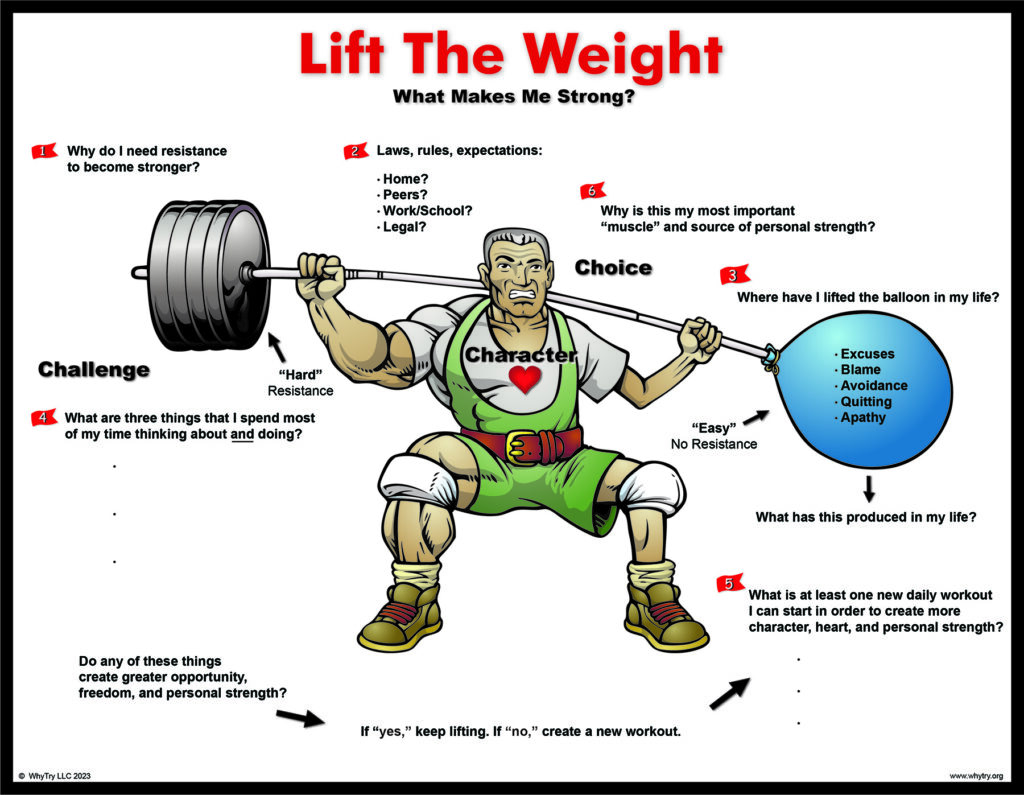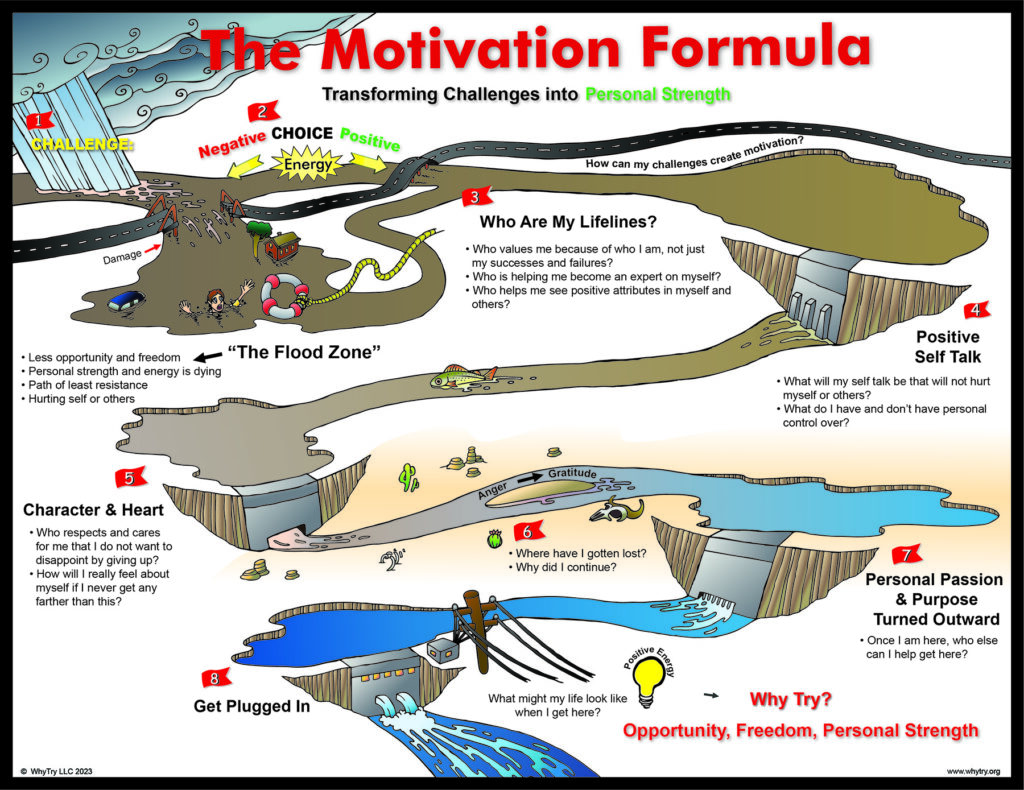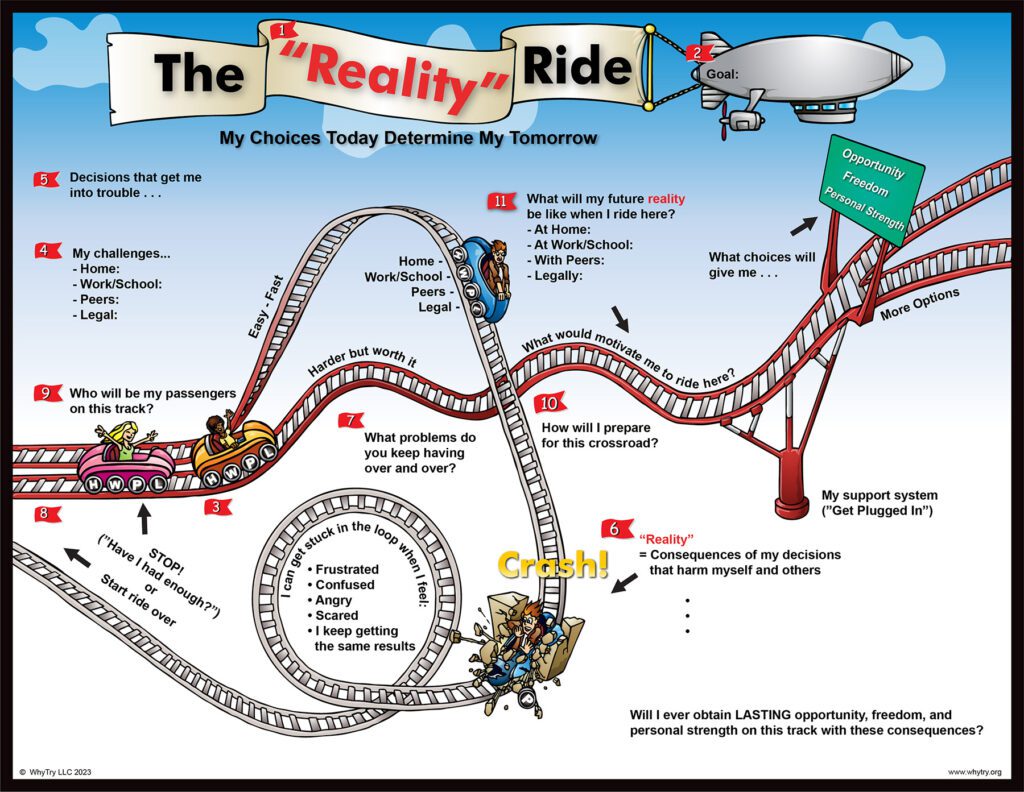What is WhyTry?
The WhyTry Corrections Program consists of ten visual analogies with solutions and questions to help students gain insight into how to deal with daily challenges. The program helps students answer the question, “Why try in life?” when they are frustrated, angry, or confused with life’s pressures and challenges. It teaches students that trying hard in life and putting effort into challenges at home, at work, with peers, and in the legal system is worth the effort.
What is the Goal?
The program’s goal is to increase resilience and pro-social behaviors. It transforms a person’s “limited view” – focused on today’s problems, obstacles, and personal weaknesses – into a “big view,” where tomorrow’s opportunities and personal strengths are clear. The program encourages use of the WhyTry Corrections Facilitator’s Manual, journaling, active listening, giving feedback, effective reinforcement, and other multisensory tools to improve employment retention and legal compliance and address negative peers, internal and external control, negative relapse cycles, and personal responsibility.
How is it used?
The WhyTry Program is used nationwide in thousands of drug courts, prisons, detention centers, jails, halfway houses, probation departments, residential treatment programs, and more. It teaches social and emotional skills using evidence-based strategies, including Motivational Interviewing (MI), Solution Focused Brief Therapy (SFBT), Reality Therapy (RT), and Cognitive Behavioral Therapy (CBT). It enables professionals to create safer, more productive, and relevant work and living environments through non-confrontational, non-threatening language and approaches.






What does a lesson look like?
WhyTry’s linear corrections curriculum is designed to change learning styles frequently, breaking lesson activities into small learning segments. The 22 cognitive thinking errors, or “Weak Think/Strong Think” concepts are spaced out over all ten lessons and relate directly to the visual metaphor being taught. Each lesson includes the following:
- A visual metaphor – Each visual metaphor is a picture with a series of questions and insights to help students apply specific social/emotional concepts to life. These metaphors are the foundation of each lesson.
- Music – WhyTry has several songs in a variety of genres – including hip-hop and rock – that reinforce the principles of the visual metaphors and serve as a powerful and emotional teaching tool.
- Video – WhyTry has a list of recommended video clips to keep students engaged and focused on the topic being taught.
- Group experiential activities – Each lesson contains at least one activity that helps maintain attention and energy and illustrates the concepts in a powerful way.
- Journal activities – Students use the WhyTry Game Plan Journal to reflect and apply WhyTry to their own life and situation. The journal prompts are used as homework following each lesson.
- Students as teachers – Students internalize their homework by teaching the class what they have learned or experienced.
“[WhyTry] is so flexible and makes so much sense in corrections settings. It fits perfectly with motivational interviewing.”
“All juvenile probation officers should be introduced to this program.”
“EVERY PERSON, man, women and child should be REQUIRED to go through your program in order to go through life… If we can do this program everywhere, in every school, we would be spending much less money and resources on prisons, youth detention and alternative schools.”
“The strength-based and resilience approach are amazing. This program feels like a completely different approach than any other cognitive behavioral group.”
“WhyTry seemed to fill all the needs that I was lacking in my other curriculum… It was relevant, exciting, tons of activities, it made sense… After working in the county for several years, I see a lot of the same students in the community centers and the alternative school programs. Because WhyTry offers so many different activities and videos, I can cater my lesson to my group.”
“I have used [WhyTry] with classes of men preparing to leave incarceration in the hopes of reducing recidivism and with classes of young women inmates in the hopes of reducing violence within the institution… The WhyTry Program has been received well by all ages, they have participated easily, given attention without prodding, and many of the men have responded with, ‘Why did I not see or realize this sooner?’… Each time I have used WhyTry, the participants are amazed at the simplicity, truth, and how they see their own life as it was throughout the program.”

